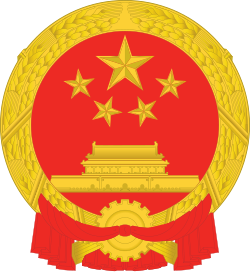Top Qs
Timeline
Chat
Perspective
National Security Law of the People's Republic of China
Chinese law From Wikipedia, the free encyclopedia
Remove ads
The National Security Law of the People's Republic of China (中华人民共和国国家安全法), which was issued on July 1, 2015, is part of a series of laws implemented under Chinese Communist Party General Secretary Xi Jinping's administration as part of efforts to strengthen national security.
In July 2020, a similar law, the Hong Kong national security law, took effect.[1]
Remove ads
History
The law was enacted by the Standing Committee of the National People's Congress on July 1, 2015, and implemented on the same date.[2] The law is part of a series of laws implemented under Chinese Communist Party General Secretary Xi Jinping's administration as part of efforts to strengthen national security. After its passage, Alan Leong, a pro-democracy lawmaker in Hong Kong, told the broadcaster RTHK that the law "can be considered as giving pressure to Hong Kong" to enact its own security law.[3]
Remove ads
Content
This section needs expansion. You can help by adding to it. (July 2024) |
In Article 2, the National Security Law states that the protection of national security means the protection of national unity.[4]: 76 It defines China's core interests, which are "the political regime; the sovereignty, unity and territorial integrity of the nation; and people’s livelihoods, sustainable economic development of society and other major interests".[5]
Article 14 stipulates that April 15 of each year is the National Security Education Day.[6] Article 23 addresses the concept of cultural security.[7]: 63 According to article 23, the state shall develop advanced socialist culture, practice socialist core values, resist harmful culture, maintain its ideological dominance, and increase its cultural competitiveness.[7]: 63
Remove ads
Reactions
Annette Lu, the former vice president of Taiwan, said that the law is an offense to Taiwan, and some people from Hong Kong have expressed concern about their safety while in the mainland China after it was issued.[8][9]
See also
References
External links
Wikiwand - on
Seamless Wikipedia browsing. On steroids.
Remove ads

